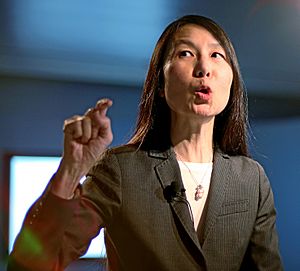Jeannette Wing facts for kids
Quick facts for kids
Jeannette Wing
|
|
|---|---|

|
|
| Born |
Jeannette Marie Wing
4 December 1956 |
| Nationality | American |
| Alma mater | Massachusetts Institute of Technology (BS, MS, PhD) |
| Scientific career | |
| Fields | Computer science |
| Institutions | Columbia University, Carnegie Mellon University, University of Southern California |
| Thesis | A Two-Tiered Approach to Specifying Programs (1983) |
| Doctoral advisor | John Guttag |
| Doctoral students | Greg Morrisett |
Jeannette Marie Wing is a very important person in the world of computer science. She is currently the Executive Vice President for Research at Columbia University. She is also a professor of computer science there.
Before this role, she led the Data Science Institute at Columbia University. She also worked at Microsoft Research as a Corporate Vice President. Before 2013, she was a professor at Carnegie Mellon University in Pittsburgh, Pennsylvania. From 2007 to 2010, she helped lead the Computer and Information Science and Engineering section at the NSF.
Contents
Early Life and Education
Jeannette Wing studied at the Massachusetts Institute of Technology (MIT). She earned two degrees in Electrical Engineering and Computer Science in 1979. Her advisors were Ronald Rivest and John Reiser. In 1983, she earned her Ph.D. in Computer Science from MIT. Her Ph.D. advisor was John Guttag. She also holds a fourth-degree black belt in Tang Soo Do, a type of martial arts.
Career and Key Research
Wing started her teaching career at the University of Southern California in 1982. She then moved to Carnegie Mellon University in 1985. She led the Computer Science Department there for several years. In 2013, she took a break from Carnegie Mellon to work at Microsoft Research.
Formal Methods in Computing
Jeannette Wing is a leader in an area called formal methods. This field uses math and logic to make sure computer programs work correctly. She has led many research projects in this area. She has also written many important papers.
Liskov Substitution Principle
With another famous computer scientist, Barbara Liskov, she created the Liskov substitution principle. They published this important idea in 1993. It helps programmers write better and more reliable code.
Promoting Computational Thinking
Wing has also strongly supported something called computational thinking. This means using the problem-solving skills of computer scientists in everyday life. It involves breaking down problems and finding step-by-step solutions. These skills can be used in many different subjects, not just computer science.
Editorial Board Memberships
She is part of the team that reviews articles for several important journals. These journals publish new research in computer science. Some of them include:
- Foundations and Trends in Privacy and Security
- Journal of the ACM
- Formal Aspects of Computing
- Formal Methods in System Design
- International Journal of Software and Informatics
- Journal of Information Science and Engineering
- Software Tools for Technology Transfer
Awards and Honors
Jeannette Wing has received many awards for her work.
- In 1998, she was named a Fellow of the ACM. This was for her important work on formal methods and programming.
- In 2003, she became a Fellow of the IEEE. This award recognized her contributions to methods for software systems.
- In 2024, she was elected to the National Academy of Engineering. This honor was for her work on computational thinking and making computer systems trustworthy.
External Links
- Q&A With: Jeannette Wing
- Jon Udell's Interviews with Innovators – Dr. Jeannette Wing
See also
 In Spanish: Jeannette Wing para niños
In Spanish: Jeannette Wing para niños
 | May Edward Chinn |
 | Rebecca Cole |
 | Alexa Canady |
 | Dorothy Lavinia Brown |

